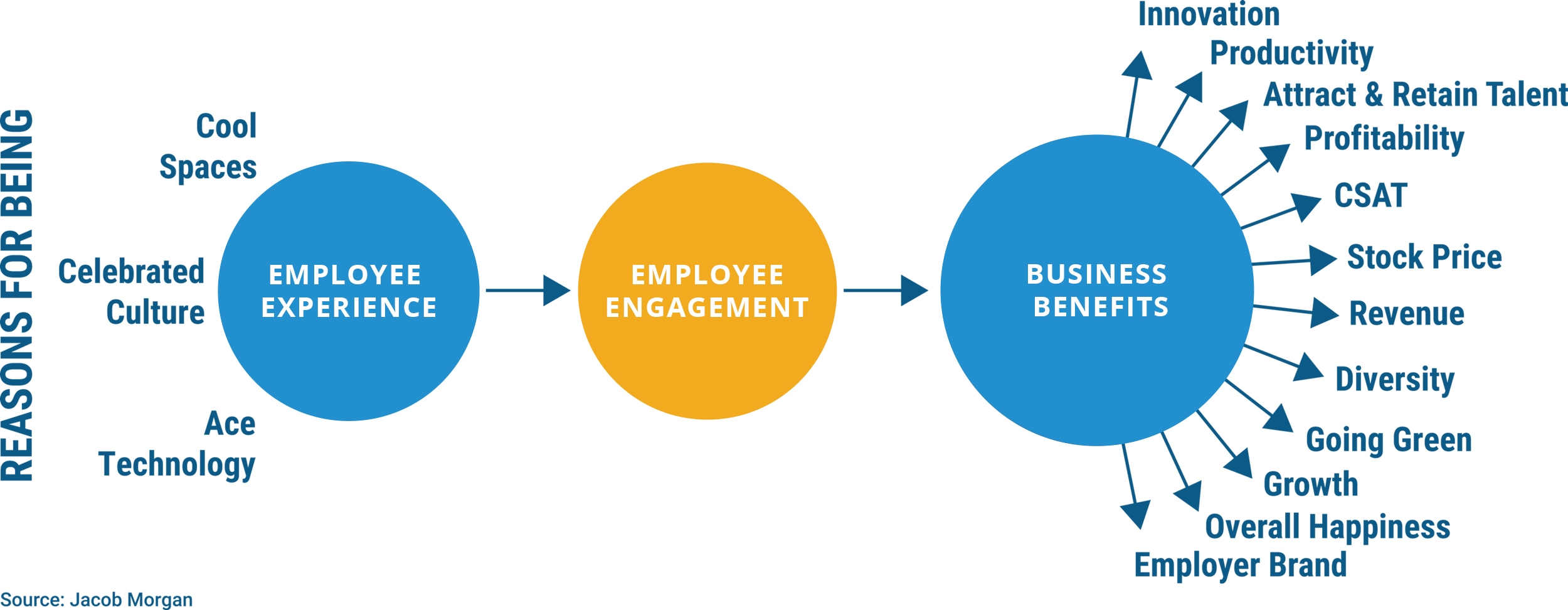Table of Contents
- What is employee experience?
- What is the difference between employee experience and employee engagement?
- What are the 7 stages of the employee experience life cycle?
- 8 statistics to prove why employee experience matters
- How to elevate employee experience within your organization?
- Getting started with outstanding employee experience
Step into a smarter digital workplace
Get a Free Product TourAs quoted by Simon Sinek – “People don’t buy what you do, they buy why you do it.”
Most people are not interested in who you are and what you do. They are more concerned about why you do it. When we know the reason for doing something, we do it with more passion.
It’s the same concept for employee experience.
In today’s race to compete in the digital age, strategic business leaders are grappling with complex challenges:
- How to improve customer experience?
- How to increase employee productivity?
- How to be more innovative in the workplace?
- How to help the workforce become more tech-enabled?
The solution to all these issues begins in the same place: with your people. The business benefits of great employee experience span beyond creating the best workplace. When employee experience is positive, they are more passionate to achieve better business outcomes, make customers and investors happier.
If you neglect the experience of employees, you do it at your peril. Because employee experience impacts every aspect of business – workplace culture, productivity, retention, innovation, business revenues, and more. Let’s understand everything about employee experience:
What is employee experience?
Employee experience has become more popular among corporates in the last few years. It is a broad concept that includes employee lifecycle management, identity management, improved workplaces, and more. Modern organizations must think about employee experience from a better perspective providing them with a better role, technology, manager support, and well-being.
What is the difference between employee experience and employee engagement?
A Gallup study distinguishes the difference between employee engagement and employee experience and boils down to the concise definitions of both terms.
- Employee experience is the journey of the employee within the company.
- Employee engagement is an ongoing part of the employee experience.
Employee experience model by Jacob Morgan

The above model boils down the concept into three distinct stages: employee experience, employee engagement, and business benefits. This framework offers businesses a new way of visualizing the overall journey of employees as a funnel, where the ultimate goal is to move through every stage and achieve maximum business benefits. So, it is clear that employee experience is the bigger picture of the overall lifecycle of the employee, while engagement is just a puzzle piece that helps in creating the picture. In a nutshell, if you focus on the experience of employees, employee engagement is bound to happen in the organization. However, focusing only on employee engagement is not enough to reap business benefits.
What are the 7 stages of the employee experience life cycle?
The employee experience lifecycle consists of seven critical stages. Employers have ample opportunity to apply best practices that affects talent acquisition, employee performance, employee engagement, and experience. According to Gallup, the stages of the employee lifecycle start from the attraction and hiring process to employment and departure. The interaction, experience, and overall journey of the employees at each stage are more important than the employee lifecycle.

The employee experience is directly related to the performance of employees in the organization and employer brand. Below are some important points to consider at each stage of the lifecycle to improve employee experience:
| Attract | What are the key elements of organizational culture that can be highlighted to attract top talent? |
| Hire | Is the hiring process fair? |
| Onboard | Do the new hires experience organizational values during the onboarding process? |
| Engage | Do the employees involved n their work and feel enthusiastic? |
| Perform | Does the review of all employees seem accurate and fair? |
| Develop | Do the organization offer personalized career paths? Do the top performers see their growth? |
| Depart | Why the best talent leaves the organization? Does the exit program create a positive employee experience? |
8 statistics to prove why employee experience matters
Employees are resources but they are human beings too. Most organizations are concerned about the importance of treating their employees as individuals and not just elements.
Making employees happy helps in gaining enormous business benefits, and employee experience goes far beyond making them happy. It is all about attaining maximum benefits along with the engagement, happiness, and productivity of employees. Here are 8 proven reasons why employee experience matters:
1. Increased positive experience leads to better productivity
Happy employees are up to 20% more productive at the workplace.
The positive employee experience at different stages of the lifecycle leads to happy employees. It not only builds stronger organizational culture but also helps in improving the business performance. So, it is vital to invest in the happiness of employees through positive employee experiences to increase productivity at work.
2. Disengaged employees can lead to increased business cost
When employees are disengaged, it can cost the business between $450 billion to $550 billion per year. Building an engaged workforce is very important to save business costs. And the first step towards leveraging the benefits of employee engagement is to invest in employee experience. Keeping your employees engaged is in the best financial interest of the company.
3. Work culture can be a major barrier to organizational success
64% of employees feel they do not have a strong work culture.
The majority of employees think that the work culture of their organization is not strong. When the employee experience is improved, it can shape the cultural environment of the organization positively.
4. Financial incentives are not the only factor to drive employee satisfaction
The employee support initiatives drive employee satisfaction by 37% at Google.
Google is considered one of the best places to work. The company has substantially invested in employee support. It clarifies that only financial incentives are not enough to foster employee productivity and satisfaction.
5. Unhappy employees leads to more absence
Unhappy employees take additional 15 sick leaves every year as compared to the average worker.
Unhappy employees are not only low on productivity at the workplace, but they also take more leaves than average workers. The increased absenteeism can lead to reduced productivity, morale, and finances of the company. However, investing in employee experience can reduce the high absenteeism cost.
6. Engaged employees lead to better business profits
Organizations with highly engaged employees outperform peers by 147% earning per share.
While disengaged employees lead to increased business costs, engaged employees can lead to improved business profits. As employee engagement and experience go hand in hand, it is vital to work on every stage of the employee experience lifecycle. It not only leads to a higher level of employee morale and happiness but also increased earnings.
7. Physical workspace can lead to higher employee performance and satisfaction
Employees can experience higher levels of job performance, satisfaction, and innovation when they have a choice to work in a physical environment.
The physical work environment of employees has a direct impact on creativity, job performance, and satisfaction. The physical environment needs to be designed in a very thoughtful manner because it is one of the top three elements that create employee experience.
8. Mind of employees will work better if they feel happy at workplace
The brain of employees works better when they are happy.
A happy brain functions much better. Investing in an employee experience increases the happiness of the team and the overall success of the organization. According to a study by The Future Workplace, over 83% of HR leaders consider that employee experience is extremely important to the success of an organization. The leaders understand that proper investment in the company culture, digital transformation tools, technology, and physical work environment of employees helps in achieving overall business success.
How to elevate employee experience within your organization?
1. Enable Seamless Communication
Not all organizations devote energy towards internal communication as they do for external communication. Always consider the employee as your key stakeholders, share good and bad news with employees, ensure open communication, and value the voice of your employees. For seamless communication, there need to be open digital channels for communication like an employee portal.
2. Get Social
Ensure that all the employees get to know each other well. The companies should get social with the employees and check with the well-being of employees. It will improve the support across peers and create a positive workplace. Team building activities and enterprise collaboration software of a digital workplace play a key crucial role in achieving a social work environment.
3. Remove Organizational Barriers
The companies should always ensure to make the work and life of your employees easier. It is preferable to adopt a digital workplace solution that automates your business processes. It also simplifies the day-to-day life of employees. A modern intranet on Microsoft 365 helps in streamlining processes like employee onboarding, vacation requests, expense reports, etc.
4. Respect and Encourage
Constantly ask for the feedback of employees. It provides valuable work and cultural insights to the leaders and empowers employees to create a work-friendly environment. Adopting a Microsoft 365 intranet can help you to acknowledge the efforts of employees and reward them in creative ways.
5. Get good technology
Specifically, a good technology for business means an effective digital workplace solution. A modern intranet enables you to improve company culture, streamline business processes, boost internal communication, and engage employees. It will help in enhancing your employee experience. While a modern intranet can make the life of employees easier, it can automate key business processes to upscale employee experience.
Getting started with outstanding employee experience
While the future of work is uncertain, one thing is sure that people are at the core of business success. Putting your employees at the center of the organization will help you deliver a superior customer experience and compete in the new world of work.
Your people have dozens of interactions: with their managers, colleagues, leaders, technology, and workspace. And every interaction contributes to the overall employee experience. When employees feel welcome, comfortable, and empowered, they return the positive energy into interactions, work, and company culture. And these factors contribute to the bottom line of business.
Are you ready to have a thriving workforce, happy customers, and successful business, get started on reshaping the employee experience? Schedule a DEMO to learn how BizPortals 365 can help you ace the employee experience.
Table of Contents
- What is employee experience?
- What is the difference between employee experience and employee engagement?
- What are the 7 stages of the employee experience life cycle?
- 8 statistics to prove why employee experience matters
- How to elevate employee experience within your organization?
- Getting started with outstanding employee experience
Step into a smarter digital workplace
Get a Free Product Tour


